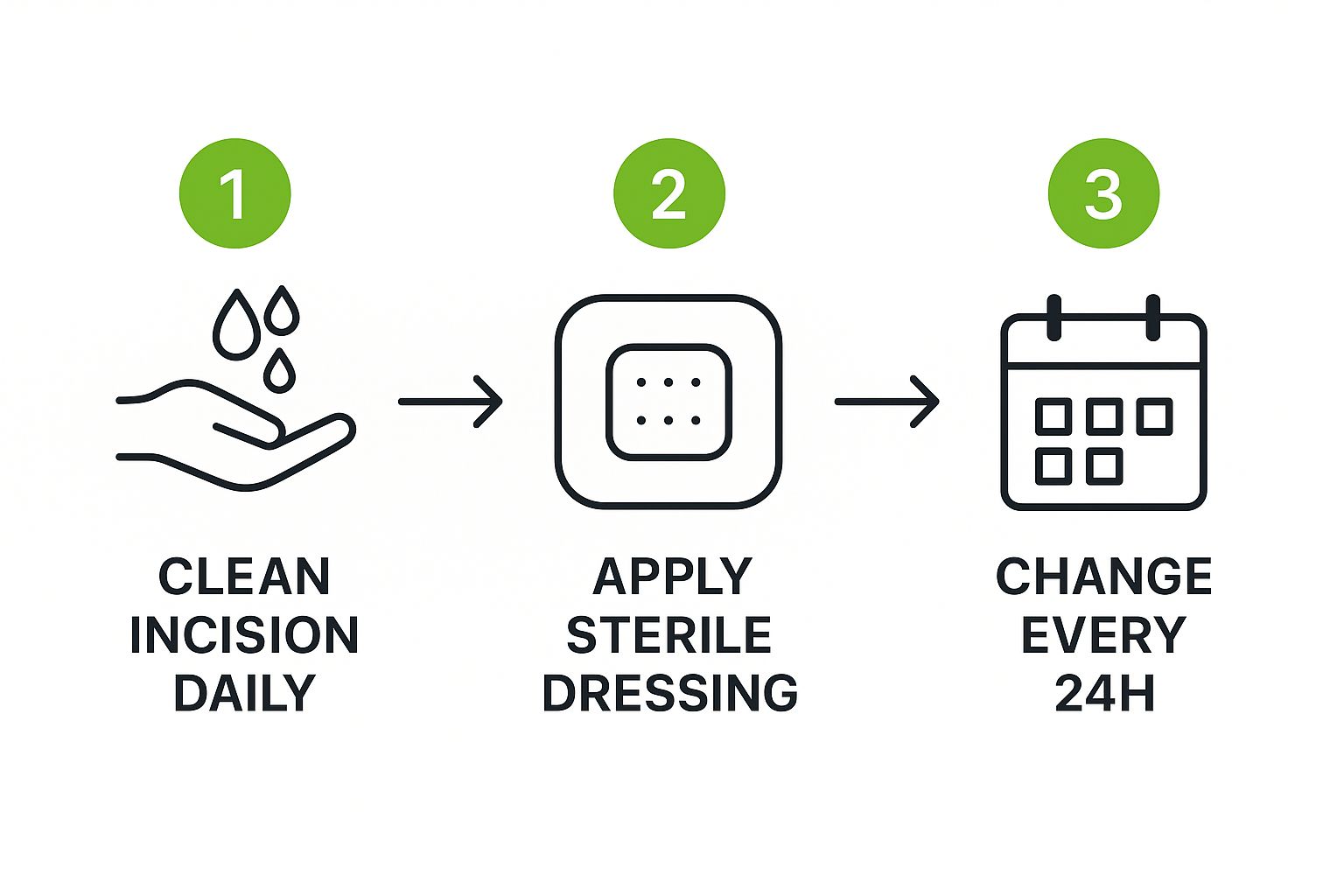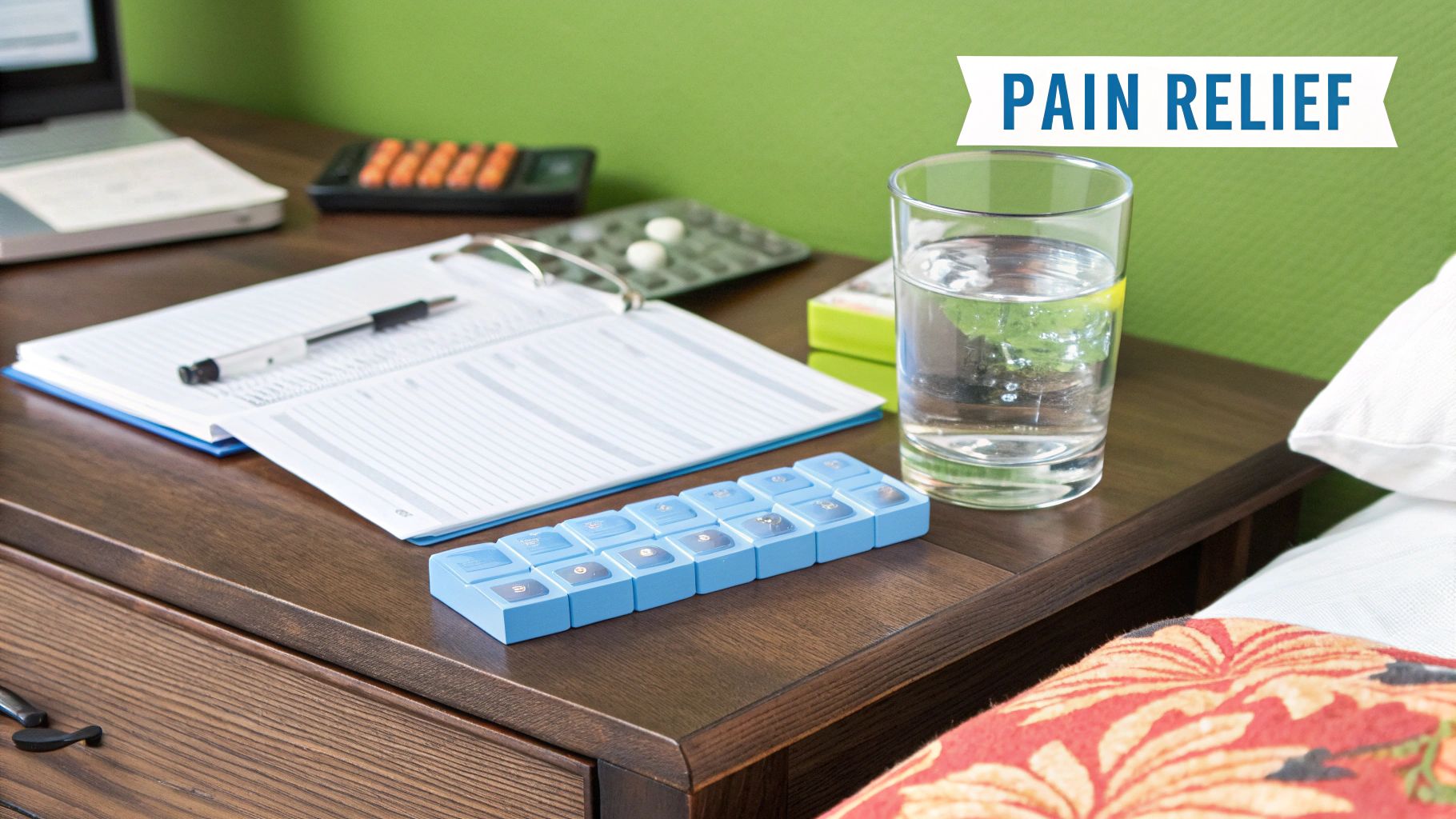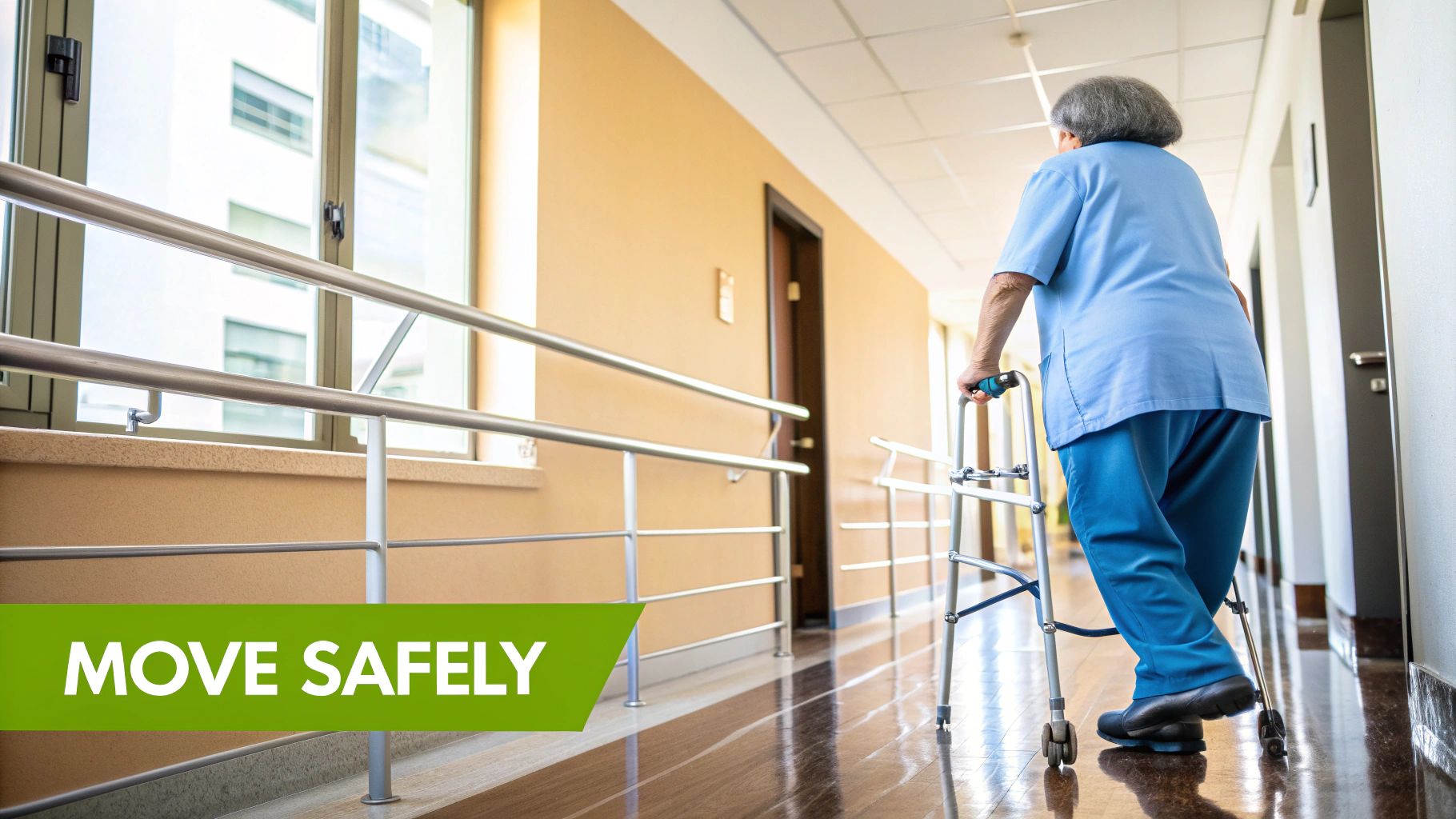Planning for home care after surgery isn't just a nice idea anymore; it's become an essential part of modern healthcare here in the UK. Hospitals are sending patients home sooner to ease the pressure on the NHS, which means a successful recovery really starts the moment you walk back through your own front door.
Why Home Care Is Key to Your Surgical Recovery
The idea of recovering at home might feel a bit daunting at first, but it comes with some serious advantages. Being in your own familiar space has been proven to lower the stress and anxiety that naturally follow any operation. That feeling of comfort can genuinely speed up the healing process.
On top of that, getting home quickly reduces the risk of picking up nasty hospital-acquired infections. By their very nature, hospitals are places where germs can spread, so getting back to your own clean, controlled environment is a huge plus for your health.
The Growing Importance of Home Support
This is where structured home care has become a real cornerstone of the UK healthcare system. In fact, studies have shown that patients who get formal home healthcare after discharge have a much lower 30-day readmission rate—around 22.5%—compared to those who don't. It's clear evidence that organised support isn't just about comfort; it's about achieving better medical outcomes.
A well-thought-out recovery strategy puts you and your family back in control, giving everyone a clear roadmap to follow. It ensures your healing is the top priority, without any preventable hiccups along the way.
By taking charge of your post-surgery plan, you can transform your home from just a place to live into a proper sanctuary for recovery. It's all about creating a personalised environment that supports both your physical and emotional wellbeing when you're feeling vulnerable.
What This Guide Will Cover
Think of this guide as your practical companion for the journey ahead. We'll walk you through everything you need to feel confident and prepared. We're going to cover some key areas, including:
- Preparing Your Space: Simple, room-by-room tweaks to make your home safe and easy to get around in.
- Daily Management: Practical tips for handling pain, nutrition, and personal care.
- Family & Professional Support: Knowing when to lean on loved ones and when it’s time to call in the professionals. This is also where understanding options like respite care for the elderly can be a game-changer for family caregivers.
Ultimately, effective home care after surgery comes down to teamwork, preparation, and knowing you’ve got the right support in place for a smooth and speedy recovery.
Creating a Safe and Comfortable Recovery Space
Turning your home into a recovery sanctuary is one of the most practical things you can do to support smooth home care after surgery. This isn't about expensive renovations; it’s about making thoughtful adjustments that make daily life safer and more comfortable while you heal. The aim is to minimise strain and cut down the risk of accidents.
A well-prepared space lets you focus all your energy on getting better, rather than wrestling with basic tasks. Even small changes can make a world of difference, especially in those first few days and weeks when your mobility is at its most limited.
Optimising Your Main Living Areas
Before the surgery, take a walk through the main pathways of your home—think about the journey from the bedroom to the bathroom, and then to the kitchen. Get rid of any potential trip hazards like loose rugs, trailing electrical cords, and general clutter. Good lighting is also a must, especially for those night-time trips to the loo, so think about adding a few nightlights in hallways and bathrooms.
This pre-planning is absolutely essential. We know from experience and studies that falls are a major risk post-surgery, with up to 30% of older adults having a fall within six months of a major operation. Simply clearing the way is a powerful preventative step.
Your home environment should work for you, not against you. A few hours spent moving furniture and clearing hazards before your surgery can prevent weeks of painful setbacks.
Part of creating a truly comfortable space is also making sure your bed is set up for proper healing, which includes selecting the right pillows for optimal support. Good alignment while you rest can seriously reduce discomfort and help your body repair itself.
A Room-by-Room Guide to Safety
Every room has its own set of challenges, so it makes sense to focus on the key areas where you'll be spending most of your time. This checklist breaks down how to prepare each space to make your recovery as smooth as possible.
Post-Surgery Home Preparation Checklist
| Room/Area | Essential Preparations | Recommended Equipment |
|---|---|---|
| Bedroom | Clear pathways around the bed. Set up a bedside table with essentials (phone, water, meds). | Bed rail, extra pillows for propping, easy-access lamp. |
| Bathroom | Remove loose bathmats. Ensure good ventilation. | Non-slip bath mat, raised toilet seat, shower chair, grab rails. |
| Kitchen | Move frequently used items to countertop level. Pre-cook and freeze meals. | Grabber tool for reaching, kettle with auto shut-off, easy-open containers. |
| Living Room | Rearrange furniture for clear, wide walkways. Secure any loose cables. | Footstool or ottoman, supportive cushions for your chair, side table for essentials. |
| Hallways | Remove all clutter and trip hazards. Ensure areas are well-lit. | Nightlights, remove or tape down loose rugs. |
By thinking through these small details beforehand, you create an environment that actively supports your recovery, rather than hindering it.
Making these adjustments helps establish a seamless routine. For anyone looking for a more structured approach, exploring options for personalised care that fits your routine can offer that extra layer of confidence for both you and your family.
Of course, a safe environment goes hand-in-hand with diligent self-care, especially when it comes to your surgical incision.

As this guide shows, proper wound care is a vital part of your daily routine at home. Consistent, careful attention to the incision site is fundamental to preventing infection and helping you heal properly.
Getting Ready to Head Home: Your Hospital Discharge Plan

Those final moments before you leave the hospital are absolutely crucial. They set the stage for how well your recovery will go at home. Being proactive here is one of the most important parts of planning effective home care after surgery. You want to walk out that door with a clear set of instructions, not a jumble of confusing leaflets.
This is your moment to get involved in your own recovery plan. Don't be shy—ask questions until you feel 100% confident about what’s next. It’s far better to get clarity now than to be second-guessing things when you’re back at home.
Key Questions to Ask Your Medical Team
Before you leave, your doctor, surgeon, or a specialist nurse will run through your care plan. This is your prime opportunity to pin down the specifics. I always advise people to write their questions down beforehand; it's so easy to forget what you wanted to ask when you're in the moment.
Try to get clear, practical answers in these areas:
- Medication: "Could you walk me through the exact schedule for my painkillers and any other prescriptions? And what are the most common side effects I should look out for?"
- Wound Care: "How often will my dressing need changing? Would you be able to show me or my family member the proper way to do it?"
- Physical Limits: "Are there any movements I need to completely avoid? When is it okay to start doing gentle things, like climbing the stairs?"
- Warning Signs: "What specific symptoms—like a fever or more swelling—should prompt me to call my GP or NHS 111 right away?"
Getting these answers straight from the source takes the guesswork out of recovery and seriously reduces the risk of complications. You and your family will feel much more empowered.
Organising Your At-Home Support Crew
Once you have the medical side sorted, it's time to think about practical help. This is where friends and family come in. To prevent anyone from getting burnt out or wires getting crossed, it’s best to get organised from the start.
Your support network is one of your most valuable assets. A simple, shared schedule can prevent one person from becoming overwhelmed and ensures all your needs are consistently met.
Something as simple as a shared digital calendar or a group chat can work wonders. You can list specific tasks and let people sign up for what they can realistically manage, whether it’s dropping off a meal, giving you a lift to a follow-up appointment, or just popping in for a couple of hours. This makes it easier for people to offer help that is genuinely useful.
Let's be realistic: the situation for elective surgery and aftercare in the UK is pretty challenging right now. NHS England reported around 7.43 million treatment waits as of early 2025, and only 58.9% of patients were treated within the target 18-week window. These kinds of delays can really affect recovery timelines, which makes a solid home support system more vital than ever. You can find out more about these NHS operational statistics and their impact.
By taking a coordinated approach, you ensure everyone knows what's needed, and you get the reliable support that makes all the difference.
Your Daily Routine for a Stronger Recovery

Once you’re back home, the single most important thing you can do is get into a gentle, consistent routine. It might sound simple, but it brings a sense of order to days that can feel chaotic and overwhelming. A good routine helps you stay on top of the essentials: managing pain, eating well, keeping clean, and moving a little.
Think of it less as a strict schedule and more as a daily rhythm that supports your body’s healing process without adding extra stress. This routine will be the bedrock of your home care after surgery, helping you navigate the physical and mental challenges of getting back to normal.
Managing Your Pain Medication
Getting ahead of the pain is absolutely crucial, especially in the first few days. It's so much easier to keep discomfort at a low level than to chase it down once it’s become severe. That’s why you must stick to the medication schedule your hospital team gave you—it’s non-negotiable.
A simple pill organiser can be a lifesaver, and setting alarms on your phone means you won’t forget a dose. It’s also a great idea to jot down when you take your medication and what your pain level is. This little log becomes incredibly helpful if you need to call your GP, as it gives them a clear, accurate picture of what's going on.
Fuelling Your Body for Healing
Food is fuel for recovery. What you eat plays a huge part in how quickly and well your body mends itself. The focus should be on simple, nutrient-packed meals that don’t take much effort to prepare. Forget gourmet cooking; your body just needs the right building blocks.
Some of the best foods for post-surgery recovery include:
- Lean Proteins: Things like chicken, fish, eggs, and beans are brilliant for rebuilding tissue.
- Vitamins and Minerals: Load up on colourful fruits and vegetables, as they’re packed with antioxidants that help fight inflammation.
- Fibre: Whole grains and legumes can help combat the constipation that often comes with pain medication and being less active.
A fantastic tip is to pre-cook and freeze some simple meals like soups or stews before your operation. It takes all the pressure off when your energy is low and you just need something nourishing.
A well-balanced diet isn't just about physical healing; it has a direct impact on your mood and energy levels. Giving your body proper fuel can make a huge difference to your mental strength during recovery.
Balancing Rest with Gentle Movement
Rest is vital, but so is gentle movement. Staying completely still for too long can increase the risk of blood clots and make your muscles weak. Your medical team will have given you specific exercises to do—make them a non-negotiable part of your day.
Even tiny movements add up. Try to shift your position regularly in your chair or bed. When you feel up to it, take short, slow walks around the house to get your circulation going. And of course, quality sleep is when your body does most of its repair work, so it's worth optimising your sleep for a stronger recovery.
Looking After Personal Hygiene
Keeping clean when your mobility is limited can be one of the toughest hurdles. A simple task like having a shower can feel like climbing a mountain, and it might not even be safe without some help. Things like a shower chair, a long-handled sponge, or a few grab rails can make a world of difference.
Never be afraid to ask for help with this. Staying clean is crucial for preventing infection, especially around your incision, but it also gives you a massive psychological lift. Feeling fresh and clean is a key part of feeling human. Our guide on https://creamhomecare.co.uk/caring-for-the-elderly-dignity-comfort-and-independence/ has some valuable insights on maintaining dignity that apply to anyone needing a bit of support at home.
Knowing When to Bring in Professional Carers
There often comes a point in the recovery journey where the incredible support from family and friends just isn’t enough. Figuring out when that moment arrives is crucial for the best possible home care after surgery. It’s never a sign of failure—it’s a smart, practical step towards a safer and smoother recovery.
The help you get from loved ones is driven by pure care and affection, but professional carers bring something different to the table: trained expertise. They’re equipped to handle tasks that go beyond making a cup of tea or offering company. Think personal care, medication management, or complex wound dressing, all handled with skill while preserving a person’s dignity.
Signs You Might Need Professional Help
It can be tricky to know when to make the call, but some situations are clear signals that professional support has moved from a nice-to-have to a must-have. If you recognise any of these scenarios, it’s probably time to start looking at your options.
- Complex Medical Needs: If recovery involves injections, fiddly wound care, or juggling multiple medications, a trained carer ensures everything is done correctly and safely.
- Living Alone: For anyone recovering without a nearby support network, professional carers are a lifeline. They help with daily tasks and provide priceless peace of mind.
- Family Carer Burnout: Looking after someone you love is exhausting work. If family members are feeling the physical or emotional strain, bringing in a professional prevents burnout and keeps the level of care consistent. To explore this topic further, you can read our guide on how respite care supports families and prevents burnout.
Bringing in professional help is a proactive decision that protects both the person recovering and their family caregivers. It ensures high-quality care continues, even when the demands of recovery become more complex or overwhelming.
The NHS and Professional Home Care
Professional home care is increasingly becoming a core part of the official NHS recovery pathway. This isn't just a trend; it's a strategic response to the immense pressure on hospital bed availability. In fact, the number of consultant-led beds in NHS England has halved over the last 30 years, down to just 145,700 as of March 2025.
To manage this, the NHS has rolled out initiatives like 'virtual wards,' with 12,700 virtual beds operational by April 2025, allowing patients to be monitored and managed from home. This shift shows just how essential professional home care has become for achieving successful post-operative outcomes. You can discover more insights about these NHS developments on kingsfund.org.uk.
What this all means is that professional carers are no longer just an optional extra. They are a fundamental part of modern recovery in the UK, bridging that critical gap between hospital discharge and a full return to health at home.
Common Questions About Post-Surgery Home Care
When you’re planning for someone to come home after surgery, it’s completely normal for a million questions to start swirling. That uncertainty can be stressful, but getting clear, straight-up answers makes a world of difference. It helps calm the nerves and lets you focus on preparing properly.
Let's walk through some of the most common queries we hear from families.
How Much Does Professional Home Care Cost in the UK?
This is often the first question on everyone's mind, and the truth is, costs can vary quite a bit. It really depends on where you are in the UK, which provider you choose, and the exact level of support needed.
As a general ballpark figure, visiting carers usually charge between £20 and £35 per hour. If the recovery calls for more round-the-clock support, live-in care typically starts from around £1,200 per week.
It’s crucial to remember that you might be eligible for financial help. This could come from NHS Continuing Healthcare or funding from your local council after a needs assessment. Always bring this up with the hospital's discharge team—they can give you the full picture of what support is out there.
What Warning Signs Should I Watch For At Home?
The hospital team will give you a specific list tailored to the surgery, but there are a few universal red flags that everyone helping with recovery should know about.
Keep an eye out for these key signs, as they mean you need to get medical advice right away:
- A fever that climbs above 38°C.
- Any obvious increase in pain, redness, or discharge coming from the wound.
- Sudden shortness of breath or any chest pain.
- New pain and swelling in a calf, which could signal a dangerous blood clot.
Trust your gut. If something just doesn't feel right about the recovery, don't hesitate. It's always better to be safe and contact your GP or ring NHS 111 for professional advice immediately.
How Long Will I Need Help After My Surgery?
There’s no one-size-fits-all answer here. The length of time someone needs support depends entirely on the type of operation and how their body heals.
For a more minor procedure, you might find that a few days of help from family and friends is more than enough.
But for major surgery, like a hip or knee replacement, it’s realistic to expect that help will be needed for several weeks, or sometimes even a couple of months. Your surgeon will provide an estimated recovery timeline, but it’s a smart move to arrange support for a little longer than you think you’ll need. It's always better to have it and not need it than the other way around.
Can I Arrange Home Care if I Live Alone?
Yes, absolutely. Plenty of people who live on their own have a smooth and successful recovery. The secret is putting a really solid plan in place beforehand.
This often means organising a mix of professional care services and getting some informal help lined up from friends, neighbours, or even local community volunteer groups.
The most important thing is to flag this with the hospital's discharge coordinator as early as you can. They are brilliant at helping to arrange a care package that ensures you are safe, supported, and confident from the moment you walk back through your front door.
At Cream Home Care, we specialise in creating personalised care plans that support a safe and comfortable recovery in Stoke-on-Trent and Newcastle-under-Lyme. If you're planning for post-surgery care, contact us to see how we can help. Find out more at https://creamhomecare.co.uk.






